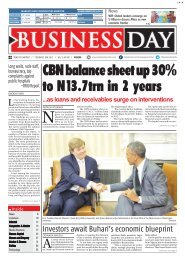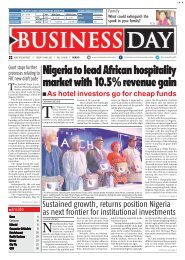You also want an ePaper? Increase the reach of your titles
YUMPU automatically turns print PDFs into web optimized ePapers that Google loves.
Wednesday May 20, 2015<br />
TRUTH & REASON<br />
Price: N150<br />
MISSILE<br />
CHRSJ to Labour Leaders<br />
“Union leaders in the country have derailed from their mandate by always using<br />
their platforms for selfish aggrandizement. They are always searching for worldly<br />
materials during their tenure of office and there should be an attitudinal change<br />
of the labour leaders in order to regain the lost glory of the labour union in the<br />
land.” The Centre for Human Rights and Social Justice (CHRSJ) accusing labour<br />
leaders of fighting for their selfish interest at the expense of the collective interest<br />
of the workers.<br />
TONY O.ELUMELU<br />
GUEST COLUMNIST<br />
Entrepreneur-led Devt as Model<br />
Too many policymakers think in<br />
terms of traditional aid when<br />
they think of support for Africa<br />
and the developing world. I think<br />
of Shadi Sabeh. Shadi is a young<br />
man from Sokoto in northern Nigeria – a<br />
region currently struggling with a lack of<br />
opportunity and economic engagement,<br />
especially for the youth. Shadi might well<br />
have become mired in frustration, but instead<br />
leveraged his entrepreneurial drive to start<br />
an education business in Sokoto that already<br />
employs over 100 people.<br />
As the recipient of the Tony and Awele<br />
Elumelu Prize for Economics from Usman<br />
Dan Fodiyo University, Sokoto, Nigeria, I<br />
took him with me this week as my guest<br />
to a White House event hosted by President<br />
Barack Obama, and to a lecture I delivered<br />
on ‘Entrepreneur Led Development: A New<br />
Development Model for Africa’ at Georgetown<br />
University’s McDonough School of Business.<br />
In so doing, he served as a model for the most<br />
promising approach for promoting growth<br />
in Africa and creating stability and security<br />
everywhere.<br />
What Shadi’s story tells us is simple:<br />
Entrepreneurship is the most effective way to<br />
establish true prosperity. Only entrepreneurship<br />
can create sustainable wealth – the wealth<br />
that comes from employment and ownership,<br />
and that results in thriving markets and a<br />
healthy society.<br />
Only entrepreneurship can create opportunity<br />
where none seemingly exists.<br />
To understand why this is so critical,<br />
consider: By 2020, 122 million Africans will<br />
enter the labour force. The number of new<br />
jobs that must be created to accommodate<br />
this demographic explosion is enormous.<br />
Added to this are tens of millions currently<br />
unemployed or underemployed, making the<br />
human and economic consequences nearly<br />
too large to imagine if job creation is not<br />
seen as a priority.<br />
This demographic explosion can spell an<br />
economic boom or doom for the continent.<br />
Traditional aid and traditional extraction<br />
focused investment cannot provide employment<br />
for the millions of young Africans entering<br />
the job market every year – any more<br />
than they can provide for the continent’s<br />
massive needs for reliable power generation,<br />
housing, transportation and financial services<br />
infrastructure. Entrepreneur-led job creation<br />
is necessary to overcome these challenges.<br />
This realisation represents a fundamental<br />
change. Traditionally, in Western societies,<br />
the concept of African development has been<br />
linked to foreign aid. Aid-based approaches<br />
have much to recommend them – they have<br />
improved untold millions of lives across the<br />
continent.<br />
But speaking as an African who is grateful<br />
for the lifesaving anti-retrovirals that have<br />
saved so many of our people, the vaccines,<br />
the emergency food assistance and the debt<br />
relief provided to my fellow African citizens,<br />
I believe that it is the economic opportunity<br />
side of the development coin that will have<br />
more catalytic impact in driving development<br />
on the African continent.<br />
Job creation is at the heart of this process.<br />
Each job means the chance to pull a family<br />
President-elect, Muhammadu Buhari<br />
permanently out of poverty, a wider tax revenue<br />
base for African governments, a household<br />
that can buy goods and services created by<br />
African businesses and greater social stability<br />
because minds are constructively engaged.<br />
The result is a healthy middle class that drives<br />
the growth of infrastructure, housing and<br />
financial inclusion. And financial inclusion<br />
leads to a safer, more stable world.<br />
Such a private-sector driven transformation<br />
is already in progress. African companies<br />
like Dangote Cement, South African<br />
telecommunications firm MTN and the United<br />
Bank for Africa, which I chair, are creating<br />
hundreds of thousands of jobs across Africa,<br />
working to provide essential services like<br />
mobile phones, infrastructure and banking<br />
while integrating the continent.<br />
Most of these companies – like others in<br />
Africa and around the world – were created<br />
by individual African entrepreneurs. If we are<br />
to meet the challenge of creating jobs for the<br />
millions of Africans entering the workforce<br />
every year – and the millions who cannot<br />
find work today – we must support today’s<br />
entrepreneurs by creating policies that improve<br />
Job creation is at the<br />
heart of this process.<br />
Each job means the<br />
chance to pull a family<br />
permanently out of<br />
poverty, a wider tax<br />
revenue base for<br />
African governments,<br />
a household that can<br />
buy goods and services<br />
created by African<br />
businesses and greater<br />
social stability because<br />
minds are constructively<br />
engaged<br />
the enabling environment, so that millions<br />
of these potential job creators can succeed.<br />
I call this idea – that the private sector has a<br />
profound role to play in Africa’s development<br />
– Africapitalism. Africapitalism means that<br />
we cannot leave the business of development<br />
up to our governments, donor countries and<br />
philanthropic organisations. We must instead<br />
rely on and empower African businesses – with<br />
entrepreneurship as its driving force.<br />
Africa is rich in entrepreneurial energy and<br />
talent. Many African entrepreneurs are already<br />
running home-grown businesses and have<br />
deep insights into local consumer demand;<br />
they can spot unique gaps in the market for<br />
specific products and services. These are the<br />
people who can fuel Africa’s future, but who<br />
often lack the capital, training and support to<br />
take their small businesses to a national or<br />
regional scale. In Nigeria alone, 95 per cent<br />
of start-ups fail in the first year, largely due<br />
to regulatory and infrastructure issues. But<br />
many more of them can succeed with the right<br />
support and the right enabling environment.<br />
I have so much belief in the potential of<br />
nascent and budding African entrepreneurs that<br />
I have committed $100 million to support them<br />
directly. The Tony Elumelu Entrepreneurship<br />
Programme (TEEP) is designed to identify<br />
1,000 African entrepreneurs every year over<br />
the next decade and provide them with much<br />
needed training, mentoring, financing, and<br />
networking.<br />
The initial reaction to the Tony Elumelu<br />
Entrepreneurship Programme shows the<br />
energy behind African entrepreneurship. For<br />
the first 1,000 available slots, we had over<br />
20,000 applicants from 54 African countries<br />
and territories. The winners represent 52<br />
African countries and territories as well as<br />
a multitude of value-adding sectors ranging<br />
from agriculture to education to entertainment<br />
to technology.<br />
But the Tony Elumelu Entrepreneurship<br />
Programme alone cannot transform Africa.<br />
Political leaders, business leaders and<br />
philanthropists must embrace entrepreneur-led<br />
development on a wide scale. I appreciate the<br />
role that President Obama and President Paul<br />
Kagame of Rwanda, as well as entrepreneurs<br />
and philanthropists like Jeff Skoll, the Omidyars<br />
and Richard Branson, have played in supporting<br />
entrepreneurship as a development path for<br />
Africa.<br />
To those leaders I say, “thank you” – for<br />
supporting the transformation of Africa by<br />
supporting African entrepreneurs. To the rest<br />
I say, “Will you join me?” My commitment<br />
to entrepreneurship is unbounded. I count<br />
myself among those who believe that five<br />
entrepreneurs transformed the U.S. into what<br />
it is today – John D. Rockefeller, Cornelius<br />
Vanderbilt, Andrew Carnegie, Henry Ford<br />
and J.P. Morgan. Now it is Africa’s turn. But<br />
I myself can only do so much. Let us work<br />
together to support Africa’s entrepreneurs<br />
– Shadi Sabeh and millions like him – and<br />
secure Africa’s future.<br />
Printed and Published in Lagos by THISDAY Newspapers Limited. Lagos: 35 Creek Road, Apapa, Lagos. Abuja: Plot 1, Sector Centre B, Jabi Business District, Solomon Lar Way, Jabi North East, Abuja .<br />
All Correspondence to POBox 54749, Ikoyi, Lagos. EMAIL: editor@thisdaylive.com, info@thisdaylive.com. TELEPHONE Lagos: 0802 2924721-2, 08022924485. Abuja: Tel: 08155555292, 08155555929<br />
24/7 ADVERTISING HOT LINES: 0811 181 3086, 0811 181 3087, 0811 181 3088, 0811 181 3089, 0811 181 3090. ENQUIRIES & BOOKING: adsbooking@thisdaylive.com
















